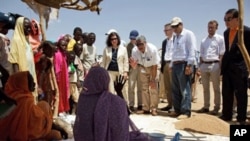The U.N. Security Council delivered a message of concern about growing violence during a visit to the Darfur region of Sudan on Friday, and called for all parties to participate in the peace process.
The council's arrival in Darfur on Thursday coincided with new Sudanese army bombings on rebel positions in Jebel Marra and the kidnapping of a Hungarian U.N. civilian staffer from his house in El Fasher.
Security Council ambassadors expressed their concern about this and other violence during meetings Friday with the local Wali - or governor - here in North Darfur. British Ambassador Mark Lyall Grant spoke for the 15-member body about it later during a news conference.
"What we have seen this year is an increasing level of violence," he said. "And I might add that we are particularly disturbed to hear yesterday of the kidnapping of a member of UNAMID right here in El Fasher and I believe that is an indication of the low level of security."
However, the Wali painted a rosy picture of the security, economic and social situation. He told the council that crimes such as carjackings, sexual violence against women and property damage are all down dramatically. He also said there is no war in this part of Darfur.
The Wali defended Sudanese President Omar Hassan Al-Bashir, who has been indicted by the International Criminal Court at The Hague on multiple charges of war crimes and crimes against humanity for atrocities committed in Darfur.
The Wali said justice should not be politicized and said Sudan has a judiciary that is capable of dealing with such issues itself. He blamed the ICC case against the president for exacerbating problems in Darfur and hindering efforts toward peace. He also told the council that they should look at the crisis with "two eyes, not one eye, and listen with two ears."
Pro-government demonstrators greeted the council for a second day in Darfur, this time shouting "down, down ICC" as their convoy left to meet tribal leaders of two camps nearby for internally displaced persons.
The council made a brief stop at the Abu Shouk camp which houses more than 50,000 internally displaced persons. The ambassadors got out for a walk around the camp where they spoke to residents.
Ambassador Lyall Grant asked a man who was making knives if he wanted to go home. The man said he does.
The diplomats said they also heard complaints from IDPs about insufficient food rations and the inadequacy of security in the camps. They said the people are frustrated because many of them have been living in the camps since 2003.
Council members also paid a visit to a hospital in the area.
UN Security Council Visits Darfur




